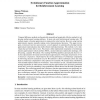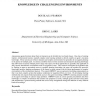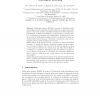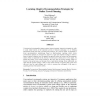161 search results - page 26 / 33 » Autonomous transfer for reinforcement learning |
126
Voted
CORR
2010
Springer
15 years 1 months ago
2010
Springer
Temporal difference methods are theoretically grounded and empirically effective methods for addressing reinforcement learning problems. In most real-world reinforcement learning ...
148
Voted
CI
2005
15 years 1 months ago
2005
Autonomous agents that learn about their environment can be divided into two broad classes. One class of existing learners, reinforcement learners, typically employ weak learning ...
129
click to vote
ICRA
2009
IEEE
15 years 8 months ago
2009
IEEE
Abstract— In general, a mobile robot that operates in unknown environments has to maintain a map and has to determine its own location given the map. This introduces significant...
155
click to vote
LAMAS
2005
Springer
15 years 7 months ago
2005
Springer
Abstract Multi-agent systems (MASs) is an area of distributed artificial intelligence that emphasizes the joint behaviors of agents with some degree of autonomy and the complexiti...
126
click to vote
ENTER
2009
Springer
15 years 8 months ago
2009
Springer
Conversational recommender systems support human-computer interaction strategies in order to assist online tourists in the important activity of dynamic packaging, i.e., in buildi...




